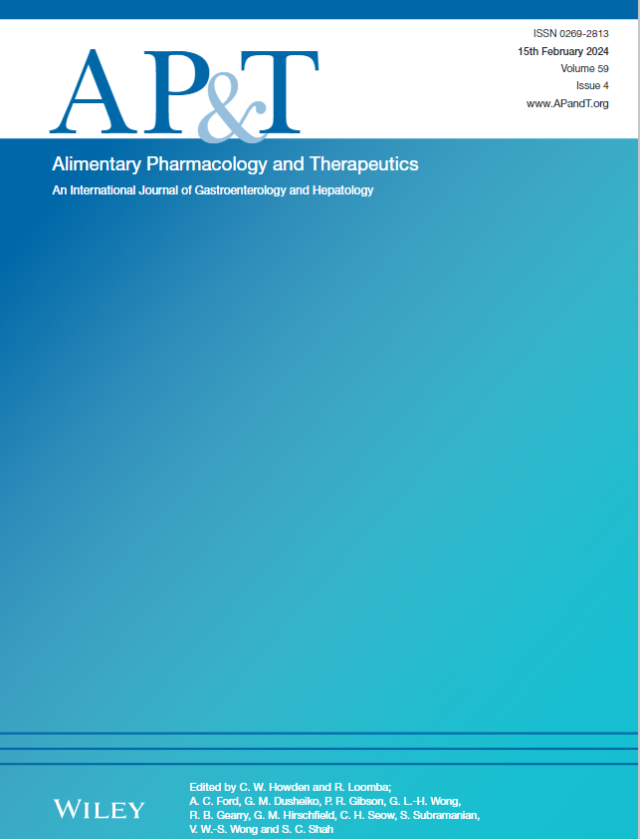炎症性肠病患者焦虑和抑郁症状的持续:一项纵向随访研究
IF 6.7
1区 医学
Q1 GASTROENTEROLOGY & HEPATOLOGY
引用次数: 0
摘要
背景:许多炎症性肠病(IBD)患者的心理健康状况不佳,但这些症状的持续时间尚不清楚。方法我们对焦虑和抑郁的患者进行了一项纵向随访研究,这些患者在1年的时间里每隔3个月收集一次症状数据。我们进一步收集了两年以上的焦虑和抑郁症状数据,以确定这些症状在IBD患者中的持续性。记录疾病结局(发作/需要糖皮质激素、药物治疗升级、住院或肠切除术),以确定情绪轨迹对IBD自然史的影响。结果770例患者中,486例(63.1%)在12个月时提供了进一步的焦虑症状数据,358例(45.5%)在24个月时提供了进一步的焦虑症状数据。在777例已确定抑郁轨迹的患者中,491例(63.2%)在12个月时提供了进一步的抑郁症状数据,362例(45.6%)在24个月时提供了进一步的抑郁症状数据。在24个月时出现焦虑症状的参与者更有可能在第一年出现波动或持续异常或恶化的焦虑轨迹(趋势p < 0.001)。在24个月时出现抑郁症状的参与者更有可能在第一年出现波动或持续异常或恶化的抑郁轨迹(趋势p < 0.001)。根据焦虑或抑郁的轨迹,不良的疾病结果不太可能出现。相当数量的IBD患者心理健康状况不佳。需要进一步的工作来确定情绪轨迹对疾病结果的长期影响。本文章由计算机程序翻译,如有差异,请以英文原文为准。
Persistence of Symptoms of Anxiety and Depression in Inflammatory Bowel Disease: A Longitudinal Follow-Up Study.
BACKGROUND
Poor psychological health affects many patients with inflammatory bowel disease (IBD), but the persistence of these symptoms is unclear.
METHODS
We performed a longitudinal follow-up study of patients whose anxiety and depression trajectories were established by symptom data collected at 3-monthly intervals over the course of 1 year. We collected further anxiety and depression symptom data at yearly intervals over 2 years to determine the persistence of these symptoms in patients with IBD. Disease outcomes (flare/need for glucocorticosteroids, escalation of medical therapy, hospitalisation, or intestinal resection) were recorded to determine the effect of mood trajectories on the natural history of IBD.
RESULTS
Of 770 patients with established anxiety trajectories, 486 (63.1%) provided further anxiety symptom data at 12 months, and 358 (45.5%) at 24 months. Of the 777 patients with established depression trajectories, 491 (63.2%) provided further depression symptom data at 12 months, and 362 (45.6%) at 24 months. Participants with symptoms of anxiety at 24 months were more likely to have a fluctuating, or persistently abnormal or worsening, anxiety trajectory during the first year (p < 0.001 for trend). Participants with symptoms of depression at 24 months were more likely to have a fluctuating, or persistently abnormal or worsening, depression trajectory during the first year (p < 0.001 for trend). Adverse disease outcomes were no more likely according to anxiety or depression trajectories.
DISCUSSION
Poor psychological health persists for a substantial number of patients with IBD. Further work is needed to establish the long-term effect of mood trajectories on disease outcomes.
求助全文
通过发布文献求助,成功后即可免费获取论文全文。
去求助
来源期刊
CiteScore
15.60
自引率
7.90%
发文量
527
审稿时长
3-6 weeks
期刊介绍:
Alimentary Pharmacology & Therapeutics is a global pharmacology journal focused on the impact of drugs on the human gastrointestinal and hepato-biliary systems. It covers a diverse range of topics, often with immediate clinical relevance to its readership.

 求助内容:
求助内容: 应助结果提醒方式:
应助结果提醒方式:


